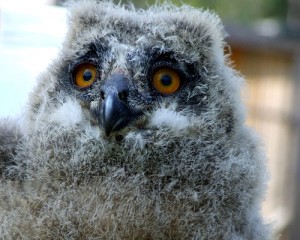Dum la lasta renkontiĝo, Darcy menciis la vorton “gufo” kiel la vorto por la angla “owl.” Tiu momente suprizas min: Mi anstataŭe konas la vorton “strigo.” Do, mi kontrolis la aferon.
Unue, mi kontrolis la Universalan Vortaron, por certigi min, ke ambaŭ vortoj ja estas fundamenta:
- strig’ hibou | owl | Eule | сова | sowa.
- guf’ grand-duc | owl | Uhu | филинъ | puchacz.
Tiam, mi kontrolis ĉi tiun paĝon pri nomoj de “European Owls.” Estis klara, ke strigo estas ĝenerala termino, kaj gufo estas la Eŭropa Aglo-Strigo (kaj, oni suposas, similaj grandaj strigoj kun plumtuftoj ĉe la oreloj).

Kvar semajna gufido.
Pri la gufujoj (mi nun priparolas pri la sen-fuma, sen-alkohola trinkejo por junuloj ĉe Esperantaj aranĝoj), Vikipedio diras, ke la terminon oni elektis ĉar la gufo “aktivas nokte.” Sed mi kredas, ke ĉi tiu bildo montras la ĝustan kialon.
Ĉu tiu ne precize aspektas kiel juna Esperantisto, kiu trinkis tro da teo (kaj ne sufiĉe da alkoholo)?
Foto de Judepics, uzita per permesilo “Creative Commons.”During the last meeting, Darcy mentioned the word gufo as the Esperanto word for “owl,” which surprised me because I knew word for owl as strigo. So, I checked into the two words.
First, I checked the Universala Vortaro, to verify that both words really are fundamenta:
- strig’ hibou | owl | Eule | сова | sowa.
- guf’ grand-duc | owl | Uhu | филинъ | puchacz.
Then I checked this page on European names of owls. From that it’s clear that strigo is the general term and that gufo refers to the European Eagle Owl (and, presumably, other similar large owls with feather tufts at the ears).

Kvar semajna gufido.
As far as gufujoj goes (and here I’m speaking of the no-smoking, no-alcohol drinking spots for youth at Esperanto conferences), the Esperanto Wikipedio entry says that the term was chosen because the gufo is “active at night.” But I believe this picture shows the real reason.
Doesn’t that look just like a young Esperantist who’s had too much tea (and not enough booze)?
Photo by Judepics, used under a “Creative Commons” license.

